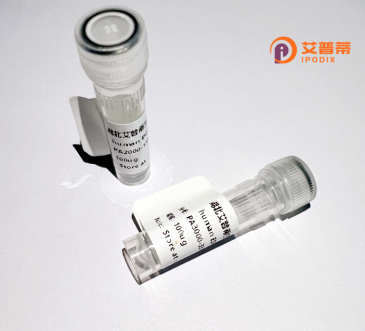
| 纯度 | >90%SDS-PAGE. |
| 种属 | Human |
| 靶点 | SASH3 |
| Uniprot No | O75995 |
| 内毒素 | < 0.01EU/μg |
| 表达宿主 | E.coli |
| 表达区间 | 1-380 aa |
| 活性数据 | MLRRKPSNAS EKEPTQKKKL SLQRSSSFKD FAKSKPSSPV VSEKEFNLDD NIPEDDSGVP TPEDAGKSGK KLGKKWRAVI SRTMNRKMGK MMVKALSEEM ADTLEEGSAS PTSPDYSLDS PGPEKMALAF SEQEEHELPV LSRQASTGSE LCSPSPGSGS FGEEPPAPQY TGPFCGRARV HTDFTPSPYD HDSLKLQKGD VIQIIEKPPV GTWLGLLNGK VGSFKFIYVD VLPEEAVGHA RPSRRQSKGK RPKPKTLHEL LERIGLEEHT STLLLNGYQT LEDFKELRET HLNELNIMDP QHRAKLLTAA ELLLDYDTGS EEAEEGAESS QEPVAHTVSE PKVDIPRDSG CFEGSESGRD DAELAGTEEQ LQGLSLAGAP |
| 分子量 | 41.5 kDa |
| 蛋白标签 | His tag N-Terminus |
| 缓冲液 | PBS, pH7.4, containing 0.01% SKL, 1mM DTT, 5% Trehalose and Proclin300. |
| 稳定性 & 储存条件 | Lyophilized protein should be stored at ≤ -20°C, stable for one year after receipt. Reconstituted protein solution can be stored at 2-8°C for 2-7 days. Aliquots of reconstituted samples are stable at ≤ -20°C for 3 months. |
| 复溶 | Always centrifuge tubes before opening.Do not mix by vortex or pipetting. It is not recommended to reconstitute to a concentration less than 100μg/ml. Dissolve the lyophilized protein in distilled water. Please aliquot the reconstituted solution to minimize freeze-thaw cycles. |
1. **"SASH3 regulates T cell development and signaling via its SH3 domain-mediated interactions"**
*Authors: Li Y, et al.*
摘要:研究探讨SASH3在T细胞中的功能,发现其通过SH3结构域与下游分子互作,调控T细胞受体信号通路。重组人SASH3蛋白体外实验证实其与Lck激酶结合,影响胸腺细胞发育。
2. **"SASH3 mutations cause immunodeficiency through impaired TCR signaling"**
*Authors: Lagresle-Peyrou C, et al.*
摘要:该文献通过基因分析发现SASH3突变导致严重联合免疫缺陷病(SCID),利用重组SASH3蛋白功能回补实验,证明其参与维持TCR信号通路的完整性及淋巴细胞存活。
3. **"Structural and functional analysis of the SASH3-SLAMF1 complex in immune regulation"**
*Authors: Wang X, et al.*
摘要:解析SASH3蛋白与SLAMF1受体结合的分子机制,重组表达人SASH3并证实其通过介导免疫突触形成,调控自然杀伤细胞(NK细胞)的激活与效应功能。
4. **"SASH3 as a potential tumor suppressor in T-cell leukemia"**
*Authors: Chen J, et al.*
摘要:研究显示SASH3在T细胞白血病中低表达,通过重组蛋白过表达实验验证其抑制癌细胞增殖的作用,可能与MAPK通路负调控相关。
SASH3 (SAM and SH3 domain-containing protein 3) is a signaling adapter protein predominantly expressed in immune cells, particularly T lymphocytes. It belongs to the SLY/SASH family and contains a sterile alpha motif (SAM) and Src homology 3 (SH3) domains, which mediate protein-protein interactions critical for intracellular signaling. SASH3 plays a pivotal role in T-cell receptor (TCR)-mediated signaling pathways, regulating T-cell activation, proliferation, and immune homeostasis. Studies link SASH3 dysfunction to severe immunodeficiencies, such as X-linked combined immunodeficiency (XL-CID), where mutations impair T-cell development and function. Recombinant human SASH3 protein is engineered using expression systems (e.g., E. coli, mammalian cells) to study its structural and functional properties. This protein enables exploration of its interactions with signaling molecules (e.g., LCK, ZAP-70) and mechanisms underlying immune disorders. Its recombinant form also aids in developing therapeutic strategies, including gene therapy for SASH3-related immunodeficiencies, and serves as an antigen for antibody production. Ongoing research focuses on elucidating its regulatory roles in immune signaling and potential applications in diagnosing or treating T-cell-mediated diseases.
×